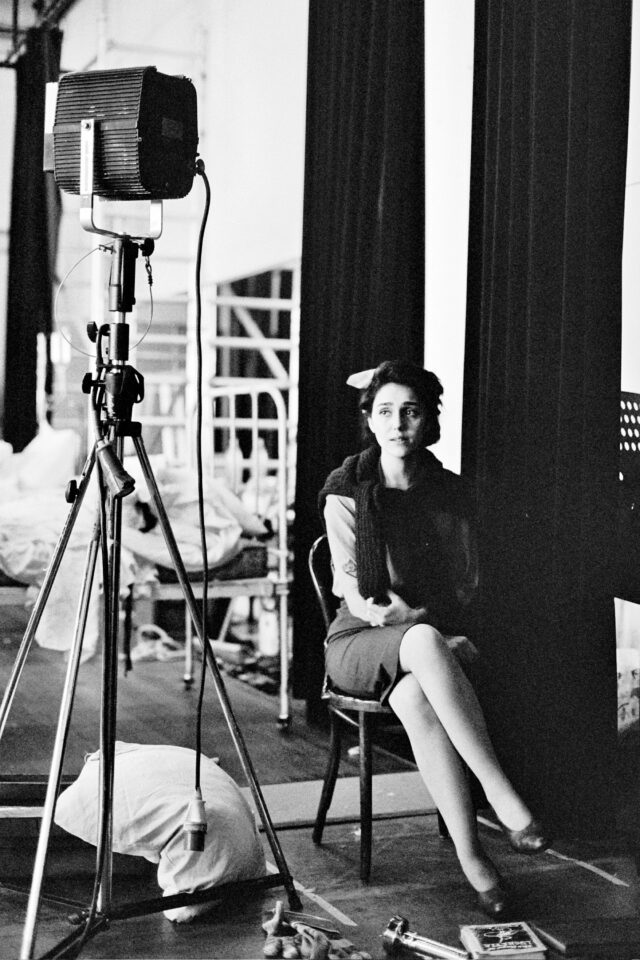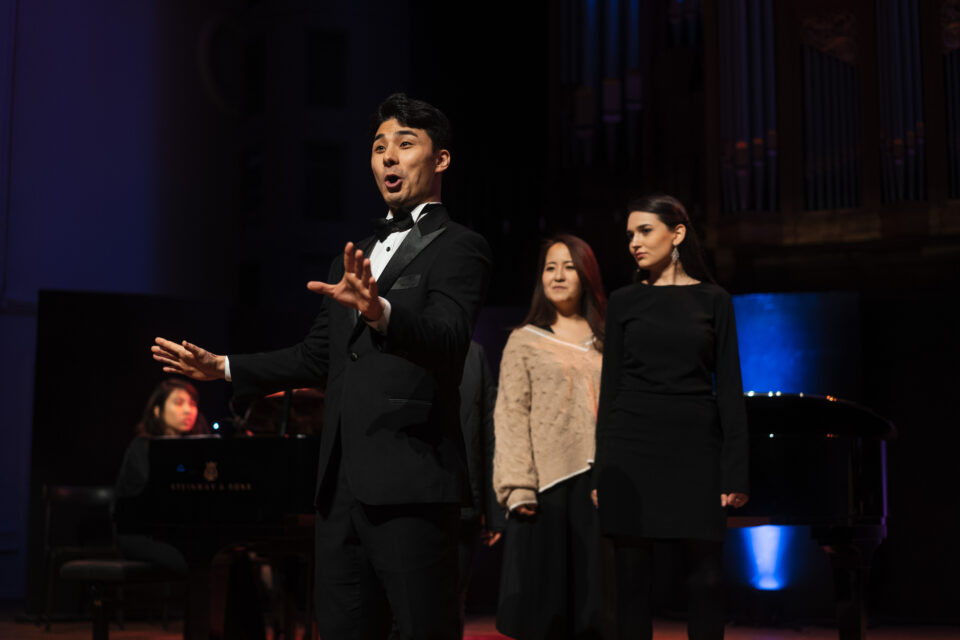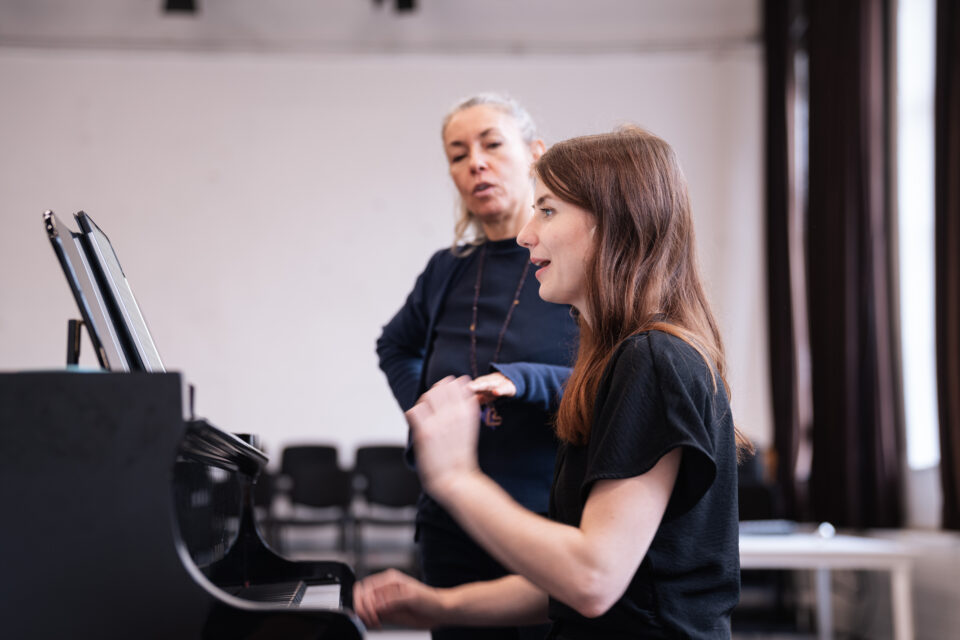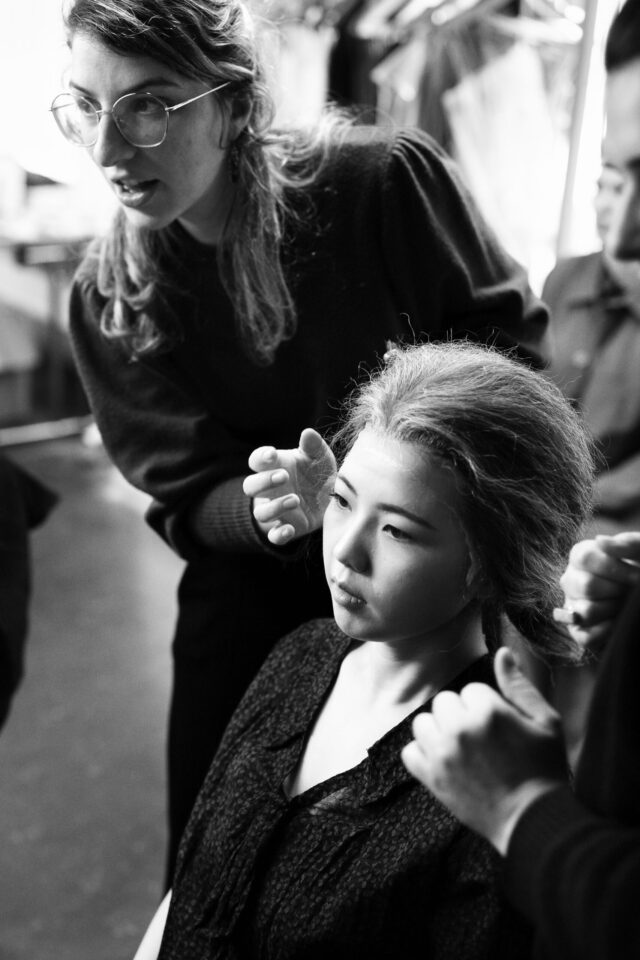Pillar 1
Interpretation and Technique
‘Interpretation and Technique’ courses provide students with specialised technical skills and knowledge, specifically aimed at professional practice. Any particular repertoire focus depends on coming projects, visiting masters, etc.
Certain courses are exclusive to singers or repetiteurs.
Repertoire Coaching
FORMAT
Practice study – collective & individual; Rehearsal; Performance
CONTENT
The main goal of the coaching sessions is to foster and explore imagination, interpretation and communication. The repertoire is analysed in detail, through in-depth study of both text and music, and the relationship between these. Translation, pronunciation, meaning, dynamics, expression marks, phrasing, intonation, vibrato, rhythm and many other components are discussed and brought together to arrive at interesting interpretations. In addition, the differences of styles are studied. The focus is always on how to communicate all of this and the meaning of the text well to an audience.
Lessons can be linked to an IOA production, or the repertoire can be entirely free of choice. Repertoire can encompass opera, song, oratorio, operetta and musical theatre styles from early baroque to
contemporary music. Some of the sessions will focus on ensemble singing and others on performing. (“Performance platforms”)
Students are given guidance for their preparation: in general, but also specifically for concerts, masterclasses or productions.
FOR SINGERS: The character’s development in a song, aria or role is studied and kept as close to reality as possible. Often, reference will be made to movement and/or acting classes. We address balance problems that may occur: how will a singer make him- or herself heard above an orchestra in a larger hall? Students receive help with choice of repertoire and Fach. They also receive guidance for their preparation: in general, but also specifically for concerts, masterclasses or productions.
FOR REPETITEURS: We monitor the development of thorough repertoire knowledge, through work in detail as well as the improvement of students’ sight-reading skills. Classes specifically aim to increase students’ ability to play and sing at the same time. Therefore, these are closely linked to the course ‘Singing Lessons for Pianists’. Where necessary, students will be given initiation to conducting and following a conductor, in preparation for the conducting classes and productions. Duo and ensemble work with singers (together with coaching singers and vocal ensembles) is discussed and put into practice.
COURSE MATERIAL
Scores (from library, Imslp, etc); many websites possible for libretti, background info etc; Spotify, Youtube for recordings; many books possible for background info; piano
EVALUATION
Continuous assessment/Permanent evaluation
English Language Coaching
FORMAT
Practice study – individual
CONTENT
English coaching classes will explore the nature of the English language in relation to the singing voice, focusing on vocal music from the opera, operetta, oratorio and song repertoire. English is the common language spoken between international students at the IOA and therefore it is all the more important that attention is given to ensure English is learnt and applied accurately when singing. The technical elements of each session will focus on all aspects of diction, with the first year of the programme concentrating on the correct pronunciation of vowels, diphthongs and consonants in sung English. The pace at which the sessions progress will depend on the ability and mother tongue of the individual student. The pronunciation of and differences between British Received Pronunciation and American Standard will also be addressed.
COURSE MATERIAL
Variety of scores and other literature either available in the library or from the teacher.
EVALUATION
Continuous assessment/Permanent evaluation
French Language Coaching
FORMAT
Practice study – individual
CONTENT
A young singer’s primary concern is his/her vocal development. Yet it is very important for a young singer to focus also on musical and acting skills and on use of languages, as well as on growing as a human being and as an artist.
During French Language Coaching, teacher and student consider the language in relationship to the voice, the music and the meaning of the text. Classes are individual and based on each student’s growth and needs (both singers and repetiteurs).
During the first year, special attention is paid to the way a singer produces a sound when singing a text. The student develops an understanding of how to sing and interpret the text with respect to his/her voice and body. During the second year, extra attention will be given to the preparation of the French roles that the singers will sing in the opera productions organized by the IOA, as well as audition arias or roles in French.
Repetiteurs will receive individual lessons during the first year, in order to gain basic French diction rules and to know how to phrase the words within the musical line. During the second year, emphasis will be put on playing and singing the text at the same time and on the primary issues for accompaniment of singers…
COURSE MATERIAL
Scores and online material
EVALUATION
Continuous assessment/Permanent evaluation
German Language Coaching
FORMAT
Practice study
CONTENT
German diction classes provide students with the following skills:
- flawless pronunciation and articulation,
- the ability to use the German language as expressive means in both singing and speaking (on stage),
- a thorough understanding of the relevant German repertoire.
Typically, students have individual coaching appointments, working on their repertoire for both IOA productions and future auditions. Students are required to bring to the lessons any German language repertoire they are working on (opera, operetta, oratorio or Lied), preferably before the onset of rehearsals.
The teacher also might suggest repertoire.
In the first year, we focus on phonetics and pronunciation, although each individual students’ needs and previous knowledge are guiding in how we spend our time. If there are several students that could benefit from theory sessions, group sessions are provided on German phonetics, pronunciation rules and grammar.
In the second year, we focus on the study of operatic roles as well as spoken parts. The study of a German language monologue is encouraged as it is often required in auditions.
COURSE MATERIAL
Cross & Lanzrein: The Singer’s Guide to German diction
Duden: Aussprachewörterbuch
EVALUATION
Continuous assessment/Permanent evaluation
Italian Language Coaching
FORMAT
Practice study – collective & individual; Lecture
CONTENT
During the first year, the course will focus at first on IPA transcription and correct reading of the language.
Every individual student will bring to class his/her repertoire to play/sing. Any individual issues will be addressed in a holistic fashion, i.e. style-technical related issues might be addressed at the same time, in order to achieve the most complete result possible.
During the second year focus will shift to recits, handling the theory of Recitativo practice first and then going deep into its performance (especially in small groups).
COURSE MATERIAL
Luciano Canepàri, Dizionario di Pronuncia Italiana
Accademia Italiana Attori, Basic rules
David Adams, A handbook of diction for singers
EVALUATION
Continuous assessment/Permanent evaluation
Russian Language Coaching
FORMAT
Practice study
CONTENT
First, the student needs to learn how to read the Russian alphabet, learn the correct pronunciation of all sounds individually and their combinations. Then together we will consolidate new knowledge on simple musical examples.
The course consists not only of training in reading and pronunciation of the language, but also in understanding the style and interpretation of Russian music. Therefore, most of the training will be about music. How exactly to do phrasing and why, how to use expression and how lyrics in music can help with this.
COURSE MATERIAL
Will be provided on the student platform
EVALUATION
Continuous assessment/Permanent evaluation

Workshops
On several occasions during the academic year, members of staff conduct workshops regarding specific themes (for example: operetta, baroque, American Songbook, audition training).
These workshops last several days, up to a week. The results may be presented to the audience during a (semi-staged) concert. Each year, new workshops are planned.
Find below the workshops 2023-2024:
Workshop Repertoire
AIMS
The aim of this workshop is to give a clear understanding, to both student and staff, of the profile, the goal and the path needed for the student to succeed.
FORMAT
Practice study – collective
CONTENT
At the beginning of the first year of the IOA programme, this workshop makes an inventory of the student’s actual skills as a singer/repetiteur. The workshop includes sessions on the student’s personal repertoire, during which the teachers’ expectations are made clear.
Students may bring repertoire of their choice. The focus is on interpretation, and how to increase and improve it. The communication of text to the audience is discussed and explored. Movements are considered as well. The following questions will be addressed (a.o.):
Has the score/text been well read and understood?
Is the context of the aria clear?
Is the background of the opera sufficiently known?
What is the relation between music and text?
Finally, students receive a general introduction of how to study and prepare and how to be ‘stylish’ on and around the stage. In this context, students can check their own preparation against the suggested methods.
EVALUATION
Continuous assessment/Permanent evaluation
Workshop 2(a) | American Songbook
AIMS
A different approach of the jazz repertoire. Being aware of rhythm and timing in a different way than classically trained singers and pianists are used to.
PREVIOUS KNOWLEDGE
No knowledge. Students are advised to listen to the material/repertoire sung by different artists and singers
FORMAT
Practice study – collective
CONTENT
We will be singing specific rhythmical exercises. The teacher will make the students aware of a different way of using the vocal chords (light music).
COURSE MATERIAL
Exercises, audio material and scores
EVALUATION
Continuous assessment/Permanent evaluation
Workshop 2(b) | American Songbook
PREVIOUS KNOWLEDGE
Workshop 2(a)
FORMAT
Practice study – collective
CONTENT
This workshop serves as preparation for a concert (for private as well as public performances) based on classical opera repertoire as well as American Songbook repertoire.
Students will be challenged to feel free and secure in presenting classical opera repertoire, as well as repertoire that may not belong to their “comfort zone” (American Songbook).
EVALUATION
Continuous assessment/Permanent evaluation
Workshop 3
FORMAT
Practice study – collective
CONTENT
The repertory of previous workshops is revised, and extended with Mozart repertory. In addition, the workshop evaluates which of the students’ own repertory can be improved to concert level.
EVALUATION
Continuous assessment/Permanent evaluation

Specialisations
There are specialisations for singers and for repetiteurs.
Specialisation for repetiteurs
Conducting Technique
FORMAT
Practice study; Rehearsal
CONTENT
Opera-related repertoire at the piano and conducting by diving into works of most different styles (baroque to contemporary)
COURSE MATERIAL
All kinds of vocal and full scores (list will be given to students later)
EVALUATION
Continuous assessment/Permanent evaluation
Harpsichord
FORMAT
Practice study; Performance
CONTENT
Making a difference in functional continuo in recits, aria’s. Reading figured Bass and reducing written out part in a functional way towards the melody line (instrument or singer), improving harmonic development.
Tuning, knowledge of different temperaments and their goal.
COURSE MATERIAL
Books, scores (through ISMLP), online material and recordings, websites.
EVALUATION
Continuous assessment/Permanent evaluation
Repetiteur Training
FORMAT
Practice study
CONTENT
Opera scenes from Figaro, Carmen, Bohème/Otello/Falstaff, Salome/Elektra/Rosenkavalier.
Standard arias repertoire.
This class aims to prepare the standard audition repertoire that is expected from a repetiteur when applying for a position in an Opera House (i.e. opera scenes from Figaro, Carmen, Bohème/Otello/Falstaff, Salome/Elektra/Rosenkavalier.). We will focus on orchestral understanding and sound, pianistic solutions and arrangements, coordination with singing and proficient diction in the main operatic languages. Furthermore, we will have practice sessions with singers, developing strategies and efficient ways to support and accompany them, even when having been given limited time to prepare.
EVALUATION
Continuous assessment/Permanent evaluation
Singing Lessons for Pianists
FORMAT
Practice study – individual
CONTENT
Singing Lessons for Repetiteurs aim to develop the voice and posture of each individual pianist and help students to prepare for specific professional situations including auditions, rehearsals and internships. There are various circumstances in which a repetiteur may be asked to sing an absent singer’s part. In this situation a repetiteur will often have to sing from offstage, possibly from the orchestra pit. Therefore, vocal projection, confidence and stamina are of great importance for students training for this role. The course will prepare students for precisely these circumstances.
Warm-up and voice exercises accompanied by the teacher will lay the foundation of each lesson. Students will gradually engage in simultaneous playing and singing, using repertoire relevant to their own personal journey.
At the outset of the course, students will learn to sing and play songs and arias in a familiar language.
Depending on the student’s potential, he or she will then engage with operatic repertoire (arias and ensembles) in different languages. As a result, students will start to become better acquainted with standard operatic and song repertoire.
COURSE MATERIAL
Variety of scores and other literature either available in the library or from the teacher.
EVALUATION
Continuous assessment/Permanent evaluation

Specialisation for singers
Vocal Advice_Pintó
FORMAT
Practice study – individual
CONTENT
The methodology includes the approach to train for self-learning and autonomy as a singer.
This implies a very conscious work on the part of the student, towards goals of continuous improvement and development as a singer and artist. Therefore, it is very important to give the student tools and resources to know how to face the vocal and musical challenges posed by each score.
It is clear that each student has strengths and areas for improvement. The teacher must adapt to the needs of each of them by planning the work in an efficient and motivating way, monitoring the student’s progress and guiding. Awareness and work on a good vocal warm-up, which will condition the emission and musical interpretation.
By listening to their interpretation, we will work on: the passages that may present technical difficulties, the musical and interpretative intentions depending on each work and its style.
It is very important that the student records the work sessions with the teacher in order to be able to listen to him/herself later with an external perspective and ear.
EVALUATION
Continuous assessment/Permanent evaluation
Vocal Advice_Wölfel
CONTENT
We focus on the student’s individual needs as a singer and performer. We work on a technical, musical and interpretative level. The student is free to choose the own repertoire. The lessons take place one-on-one.
EVALUATION
Continuous assessment/Permanent evaluation

